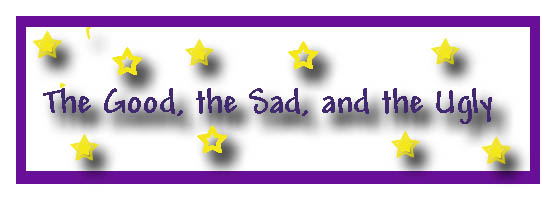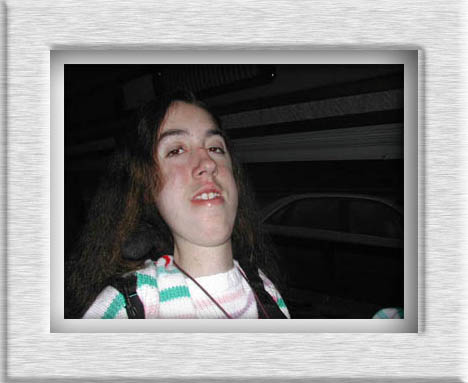 |

 |

|
About
Life...
by Liz Sanza
Let
me begin with
a wider perspective, the world around me. People seem confused
and
innocently ignorant about minorities, especially the disabled. Unfortunately, no matter how
hard the Although I certainly have my share of physical disabilities, I have a number of amazing abilities as well, and I do appreciate those! For starters, I am a passionate advocate for those with disabilities. I have a knack for music and computers, too. They mean more to me than they might if I didn’t have reduced abilities in other aspects of living. Because I can do those things, I often forget about what I can’t do. I hope to become a music therapist, and maybe someday, a professional singer. I think I’ll always continue advocating for people with disabilities, whatever else is in store for me. Interestingly, my disability gives me a
great appreciation of my life. I
look at many people who are worse off than
me and I think, “God, thank You for
giving me this life.” And the best part of life for me is the
ability to
love and to communicate, no matter what form that communication takes. As Christian says in “Moulin Rouge”, “A life
without love, that’s terrible!”
I have something called merosin deficient congenital muscular dystrophy, one of forty types of muscular dystrophy. Because of this, my muscles are very weak, and I cannot walk. Most of my gross motor skills are extremely limited without a lot of help from someone or something (like a wheelchair). Fine motor activities are difficult for me, too, but I can do them with a lot of effort. Oh, besides my muscle weakness, I have seizures. Sexuality is
something that is way too infrequently
considered as it relates to people with physical disabilities. I expect
it to
be more difficult for me to develop a romantic relationship because it is frightening for people to face
the unknown, and let’s face it, guys might think that I can’t make out
or engage
in any other type of sexual behavior. Frankly, the touchy, feely part
of a
relationship will be the most difficult for me because I can’t just
impulsively
touch or feel, I have to verbalize my desire first. Although my
hormones are
functioning very well, thank you, the difficulty with intimate
relationships
has to do with the physicality of them. It is hard for me to act on my
own, and
assistance from anyone seems somewhat awkward to deal with. Before I can even consider marriage, I need to find someone who is comfortable with the extra needs I have (wish me luck on that one!) More than anything in the world, I want children. This many seem odd or cruel to you, but I hope that if I were to have children, they (or at least one of them) would have a disability. You see, I would be able to relate with much understanding, and I think because of that I would be a better mother than if they did not. Though I would love to have children, I am not sure if I will be able to carry a child because of all my medications and scoliosis. I do know that I will be able to create a child though. When I first considered this, I was very upset. But then I realized I could have someone be a surrogate mother for me, and fortunately one of my friends said yes, which was the nicest thing someone could ever offer to do. I am still upset that I may never carry a child, but I’m working on adjusting to that reality. Social Difficulties are often a part of having physical disabilities. For me, for example, although thankfully my regular friendships have never been affected negatively by my disability, my friendships with those paid to assist me rest in a fuzzy space somewhere between friendship and business. This is especially true outside of their work times. I’ve got to tell you, it is quite hard when an assistant I’ve become close to is no longer my aide. Many times these quasi friendships fade away, and because of this, unfortunately, I have developed a complex and have trouble trusting aides I am friends with. I always tell myself I must not allow the relationship to develop into a friendship, but when you are with a person for a long time that is a difficult rule to follow. My need for a great deal of constant care bumps its head against my need for privacy; not only because of my need for physical assistance but because I also have epilepsy. I usually need help with anything that involves more than my hands. I need complete help bathing, getting dressed, brushing my hair, getting meds, transferring to and from my bed and my wheelchair and the car, etc., and being taken to the bathroom. I need some assistance eating/drinking and brushing my teeth. That’s about it. Fortunately, I do not need help in talking, singing, or typing. Every once in a while I feel like I am being babysat. The epilepsy is not fun, either. Having seizures prevents me from driving, so my life revolves around the schedule of others. I often dream that I could spend some time alone and live a private life. Nothing in my life will ever be a secret, in fact most of it is written down so people can be paid to help me. Ouch!
I see six doctors: a gastroenterologist to help me gain weight; a neurologist to keep track of my seizures and seizure medication levels; two urologists to try and get rid of the kidney stone I have (because my body does not break down calcium due to my disability); one who looks over my respiratory heath and equipment; and a nephrologists who gives me medication to break up the kidney stone...or at least keep it from growing. When I was
eleven I was in the hospital at least 4 times
because of pneumonia, once because of a collapsed lung, and another
time because
my CO2 levels were so high I was unconscious for a week.
When I was twelve I had a G-tube inserted to
give me supplemental feedings because I was only 32 pounds. Muscle weighs more than fat, and I had
neither. At fourteen I got pneumonia
again and was put in the hospital, but since that time, I have been
okay, really! Hope that you
enjoyed my story. If you have one of your own, send it my way for the
book! This slide show I put together will explain what merosin deficient congenital
muscular dystrophy is
all
about. Interested in my
perspective on things when I was younger? Another story!
Joan
Fleitas, Ed.D., R.N. Last
updated: September 22, 2006
|